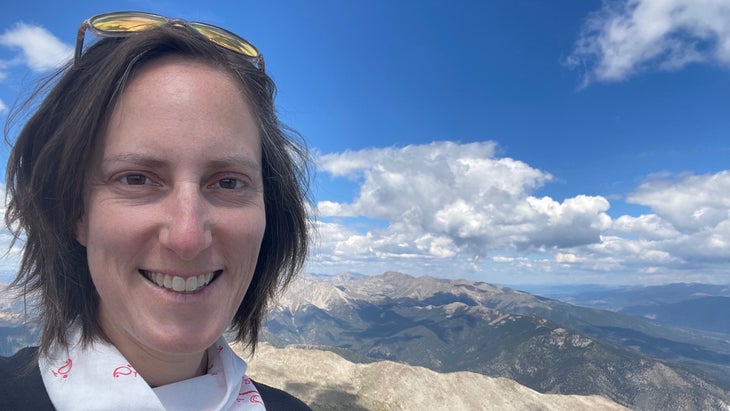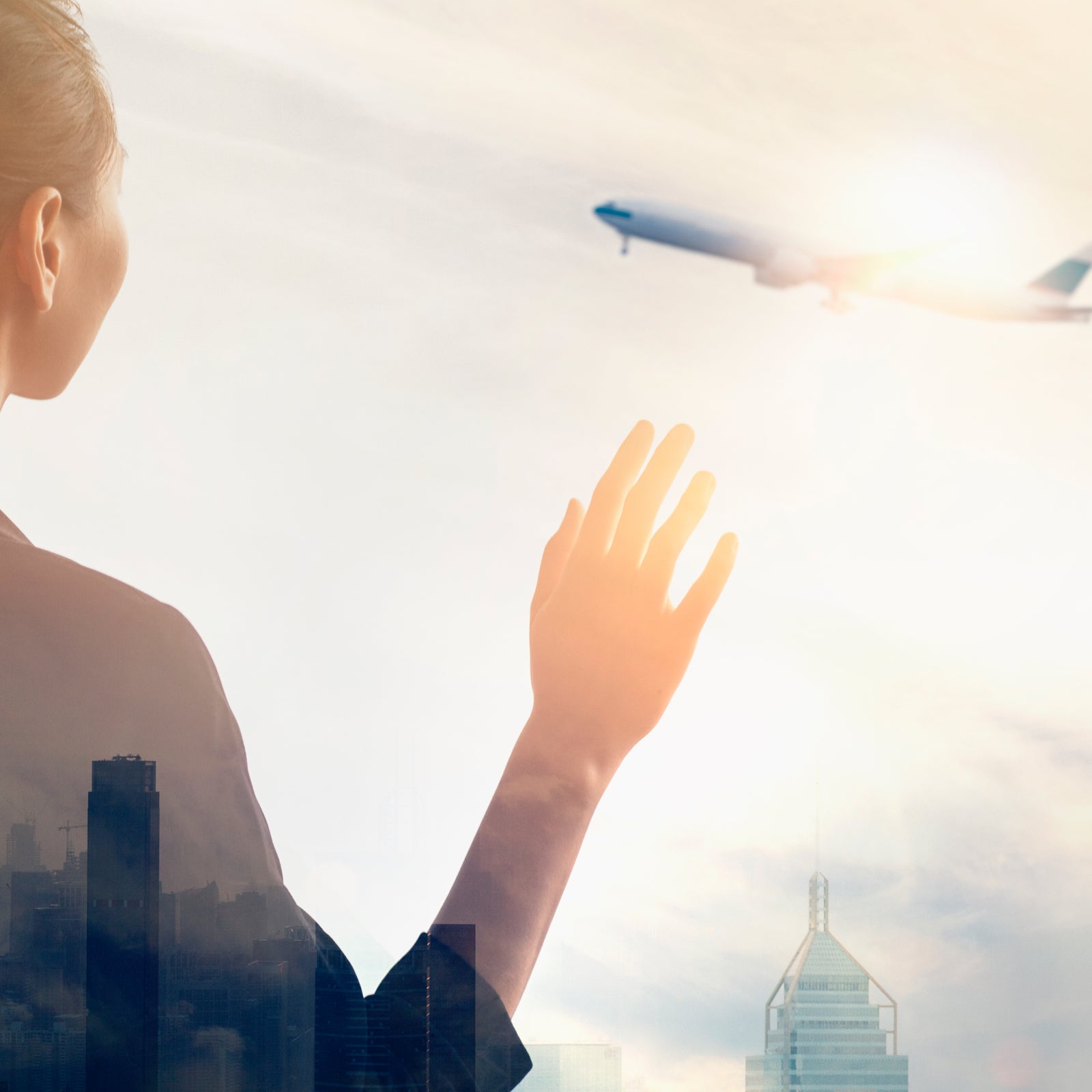Four years ago, during a Zoom work meeting, a colleague who lives in London told me she’d decided to quit flying on airplanes. She simply couldn’t stomach the cost to the climate. Due to her decision, she said calmly, she would probably never visit the U.S. again. My heart skipped a beat.
Her choice seemed so extreme. She shared it with me casually in the context of conversation, without a trace of judgment or moralizing. Still, I felt shocked and inexplicably a little defensive—but also intrigued. At the time, I traveled by air as often as ten times a year for my work as a journalist and to see family members strewn about the country. I couldn’t imagine my life without flying.
But my colleague’s comment lodged in my mind as a beautiful and challenging seed. Over the next few years, it cracked through the concrete of what had been, until then, a completely unexamined belief in my inviolable entitlement to flying. When the pandemic arrived, grounding travelers and shrinking international air travel by 60 percent in 2020, I began to see that significantly reducing air travel—or even giving it up altogether—was absolutely possible.
Rare individuals have chosen not to fly for ethical reasons for decades, but in the years leading up to the pandemic, the smattering of outliers coalesced into a movement. It took root most quickly and deeply in Sweden, which in 2017 became the first country in the world to establish a legally binding carbon-neutrality target—a year before Greta Thunberg began protesting in front of its parliament. In Swedish, the movement became known as flygskam, which translates to “flight shame,” a term commonly attributed to Swedish singer Staffan Lingberg, who gave up flying in 2017.
The number of people pledging to stop flying grew so much that Swedish air travel declined 5 percent between 2018 and 2019, and the movement strengthened in other parts of Europe as well. In the U.S., the flight-free movement, in the form of groups like Flight Free USA and No Fly Climate Sci, has been slower to spread but is growing. This year, Flight Free USA, for example, is on track to see the largest number of pledges to stop or minimize flying at 436. By comparison, tens of thousands have pledged in Europe over the past four years.
On a subconscious level, do those of us who fly believe we have the right to pollute more than others, simply by virtue of being accustomed to it? And able to afford it?
On a collective level, the reasons for minimizing commercial aviation are obvious. In 2018, the industry accounted for 2.4 percent of global emissions and has single-handedly contributed to about 4 percent of observed human-caused climate change to date. If it were a country, it would be the sixth largest polluter in the world. Currently, no aviation technology or mitigation technique exists that could minimize emissions to the extent needed to avert catastrophic warming. (Small and short-distance electric planes are in development; FAA-approved commercial models could be available as early as 2026.)
At the same time, a relatively small group of people, including me, are living large on the backs of the masses. One study found that only about 11 percent of the world’s population flew in 2018. And a startling 1 percent of the world’s population causes 50 percent of the emissions from commercial aviation. While emissions estimates vary depending on the distance traveled, the efficiency of your ground-transportation method, and the number of people in your vehicle, flying is almost always the most carbon-intensive mode of transportation mile for mile. Simply traveling less and traveling shorter distances are surefire ways to minimize emissions.
But individually, giving up flying can be hard. Surrounded by millions of others who aren’t adjusting their own behaviors, do my choices matter? Is it worth what seems like a huge personal sacrifice, when I am just one lonely person taking a stand?
Not long after my colleague’s comment, I broached the topic with a close loved one who has solar panels on his house and drives an electric car. I thought we could have a substantive discussion, but his response was simple: “I’m not going to stop flying,” he said testily. End of conversation.
This shutdown, as well as my own reluctance, made me even more curious. What did we really think we were losing? On a subconscious level, do those of us who fly believe we have the right to pollute more than others, simply by virtue of being accustomed to it? And able to afford it? I was also moved by my colleague’s matter-of-fact attitude. Although her choice seemed radical to me at the time, she didn’t seem perturbed. She wasn’t standing atop some mountain of haughty saviorism. She even seemed quietly peaceful about it. I wondered about what seemed to be an unseen reward, some hidden gain, about not flying that I couldn’t understand from the paradigm in which I dwelled.
I didn’t know any Americans who had committed to stop or minimize flying for ethical reasons until my good friend Liz Reynolds decided to take no more than one flight per year starting in 2022. She had traveled a lot, from living in Russia as a Fulbright scholar to going on pilgrimage in Japan to trekking in Patagonia. Roaming the globe was a source of freedom, a means of self-discovery, and an identity for her. But like me, when a European acquaintance told Liz she’d quit flying, she paused.
“At first, I didn’t want to be confined like that,” Liz says. Yet as she took in the news of the escalating effects of climate change, an almost debilitating climate-despair grew, and her wanderlust began to feel too big, somehow out of balance with the world as she understood it. She wasn’t quite sure how it would go to fly so little. Alternative transportation isn’t as simple in the U.S., where long-distance ground infrastructure lags behind that of Europe. Last year, when Liz came to visit me and other friends in Colorado, she rode the train from her home in Virginia. It took 53 hours. (A comparable trip in Europe, from Madrid to Berlin, would take half the time.)
Recently, I’ve begun talking with others who have renounced flying or drastically minimized their air travel. For each person, the choice sprung from a visceral experience that they couldn’t ignore. Eric Holthaus, a meteorologist and author of The Future Earth: A Radical Vision for What’s Possible in the Age of Warming, was boarding a plane at the San Francisco airport in 2013 when, reflecting on the latest dire Intergovernmental Panel on Climate Change report, he had a panic attack. He vowed to make that flight his last.
Daniel Fahey, a Lonely Planet travel writer based in England, saw a graph representing carbon emissions over the past 10,000 years, with an almost vertical line illustrating emissions in the past century, and felt queasy. His last flight was in 2018. Kim Cobb, a climate scientist and director of the Institute at Brown for Environment and Society, was filled with grief when a coral reef she’d studied for 18 years almost entirely died off during a monthslong marine-warming event in 2016. Flying home over the Pacific from Korea the next year, staring down at the vast ocean, she thought, Really, Kim? “I just remember this pit in my stomach, realizing that I don’t know how many more times I can do this,” she says of her international flight.
Kim started walking her kids to school every day, biking to and from work in Atlanta and, later, in Providence, Rhode Island, and, between 2017 and 2019, she reduced her plane travel from 150,000 miles per year to zero, transforming her life in the process. Still, sometimes life presents challenges: she chose to fly once, last September, to her brother’s wedding in Denver because a train trip would have necessitated taking her kids out of their new school for a week.
“It’s amazing how much travel is baked into middle-class, upper-middle-class culture. It’s an identity, and I wasn’t really expecting it to be that hard to break,” says meteorologist and book author Eric Holthaus. “It’s just in our bubble that it feels unthinkable.”
In 2021, I experienced my own climate gut punch. Outside offered me an opportunity to travel to the Arctic for the winter solstice, a bucket-list trip I’d dreamed about for nearly a decade that was finally materializing. But to travel so far (7,000 miles round-trip), with so many resulting carbon emissions, and to a place especially sensitive to the ravages of global warming, felt irresponsible and tone-deaf. Yet it was hard to deny a longing that felt much deeper than simply wanting an escape or an adventure. I thought hard about it and ultimately decided to go.
Lodging in an off-grid retreat center 63 miles north of the Arctic Circle in the Brooks Range of Alaska, I watched northern lights tango across the sky, cross-country-skied as polar dawn melted into polar dusk, and immersed myself in the crystalline stillness of a place that slumbers without any direct sunlight for more than a month. Those mountains, tundras, and boreal forests continue to haunt my dreams, and memories of the land’s beauty and fragility inspire my work.
But during my time there, the temperature shot upward more than 60 degrees over the course of about 24 hours, from minus 35 to a preposterous 28 degrees, an Arctic-winter heat wave that echoed broader temperature shifts and catastrophic changes debilitating the region. The cognitive dissonance of loving a place so much while also contributing directly to its demise was almost physically painful.
Flying home, a subtle tension suffused my body, as if I could feel the misalignment between my choices and my hope and concern for the world. I wanted to forget about it, ignore it, or rationalize my way out. I bought carbon offsets to mitigate my travel for that entire year, but it felt like a cheap apology. (According to one report to the European Commission, the vast majority of offset programs don’t reduce emissions.) I wasn’t sure my relationship with flying would ever be the same.
Still, voluntarily not flying while friends take holidays in far-flung places feels like nothing but a gaping and pointless loss. And while it takes a certain amount of privilege to be able to fly, it could potentially take an even greater degree of privilege to travel and not fly, given the time and expense involved. Those who have chosen to fly less or not at all say there are trade-offs.
My friend Liz declined an offer to go on a camping trip with a group of her favorite people because it would have necessitated a flight, and she has opted to do a professional training program online instead of in person. For a time, meteorologist Eric Holthaus took long train trips for work, which put a strain on his family life, and he declined his dream job at the Weather Channel because it would have required too much travel. Climate scientist Kim Cobb recognizes that if she hadn’t already been well established in her career, there would have been profound opportunity costs.
There is also an emotional risk to being an outlier. Liz has found that her choice has sometimes made people so uncomfortable that they’ve ridiculed her or immediately dismissed the idea. Many of Holthaus’s friends have responded with disbelief. “It’s amazing how much travel is baked into middle-class, upper-middle-class culture,” he says. “It’s an identity, and I wasn’t really expecting it to be that hard to break. But with that has come a chance to examine all of that privilege of having traveled and being cultured as a status symbol. It’s not really that uncommon to not fly. It’s just in our bubble that it feels unthinkable.”
Holthaus also, however, delights in the benefits of slow travel, a growing trend in which people travel more slowly and conscientiously rather than and quickly and superficially. He realized he had both more money and more time to spend outside on his vacations, and they felt more special and intentional. Daniel Fahey, the travel writer who once thought nothing of jetting from London to Beijing for a weekend, has found the challenge and novelty of traveling plane-free invigorating. “When you’re traveling slow, you’re not numb to everything else,” he says. “You’re more alive to stuff. If I fly across the country and watch a movie for an hour and a half, I’ve been disengaged from my environment.” There’s also an intrinsic value to feeling aligned with your conscience, he says.
Minimizing flying, in and of itself, is an adventure. It’s not about living within some rigid ideal but probing the forward edge of social change.
Liz spoke of the ineffable rewards of minimizing flying, how traveling more slowly felt less wrenching on her body and less transactional. Cobb feels more connected to her community and family—and she’s in better shape because she makes time to bike to work now.
I recently learned of a Buddhist teaching that speaks to this debate: a wise person always trades a lesser happiness for a greater happiness. I wondered if flying less could be the greater happiness because it’s simply a more harmonious and peaceful way of being in the world. “It’s a satisfaction with doing less, with having less, with living in deeper harmony,” Liz explained. “I do feel like I’m respecting the earth more with these choices.”
Tourism can be a great force for destruction but also a force for tremendous social good, for travelers and hosts. I certainly wouldn’t advise people to stop traveling. I am grateful for innumerable wonderful travel experiences that have entertained, delighted, and expanded my understanding of this planet and its inhabitants, human and otherwise, and deepened my empathy.
But there have also been ways that I have traveled, largely in haste and frequently aboard a plane, that have encouraged a sort of objectification of those places, as if they were products or trophies. When I plop in from out of the sky, my comprehension of a new land and its people is often decontextualized from the living fabric of the earth and my place in it. Could I have even more meaningful and adventurous travel experiences, with greater positive impacts for the places I visited, if I approached travel in a different way? Like opting for longer and more sporadic overland journeys instead of shorter trips with long-haul flights?
Last fall, my husband and I had a couple of flexible weeks and were considering a trip together, possibly to Central America. I looked into flights to Costa Rica and Belize. We could have afforded to go, but something felt empty about it, jet-setting off to a remote beach or rainforest. It felt too easy and on some level unrealistic. We decided not to go abroad and instead each took shorter trips closer to home.
I drove south a few hours from my home in Colorado, to a remote area of New Mexico. A storm arrived and blanketed the desert with snow, and I hiked through the silent sage and junipers as the sun reemerged. An owl swooped out of the dark in front of my car one evening, and an elk herd passed right before me. On my way home, cresting the Continental Divide at dawn, I passed through a forest of ponderosas perfectly encapsulated in a million faceted crystals of frost—in all of my travels to many dozens of countries, it was among the most beautiful things I have ever seen.
But I also recognized an internal shift. Instead of feeling a sense of harried entitlement that can sometimes come with the busyness of long-haul trips, and the way I have shoehorned them into my very full life, I felt a sense of humility and a deeper appreciation of what the earth was offering me through no apparent merit of my own. Internally, it was undoubtedly trading a lesser happiness for a greater happiness.
I’d like to say that I’m vowing to quit flying entirely, but because our closest family members live 15 hours away by car, that may not be realistic. My husband and I already have two obligations that necessitate flying this year. However, it is feasible to reduce our flying to one flight trip per year, and I intend to do that in 2024. It will take some imagination, ingenuity, time, and planning ahead. I recognize that the privileges of having traveled the world previously and having a flexible job and some disposable income make this choice easier than it may be for some. But there are others making this choice, and it occurred to me that minimizing flying, in and of itself, is an adventure. It’s not about living within some rigid ideal but probing the forward edge of social change.
In the relationship between individual, cultural, and systemic change, you never know exactly how your part will affect the whole. But when I started to think in a real way about limiting my flying, I noticed that my paralysis and resignation around climate change loosened. I began to feel a sense of energy and agency, even hope, however small. People everywhere, in every time, have to step into a future way of being that they can’t currently imagine. Why not me? Why not you?

Kate Siber is a correspondent for Outside magazine and the author of two children’s books. Her work has also appeared in Men’s Journal, The New York Times Magazine, and various National Geographic publications. Her next trip—by electric car—will be to Canyonlands National Park in Utah.


